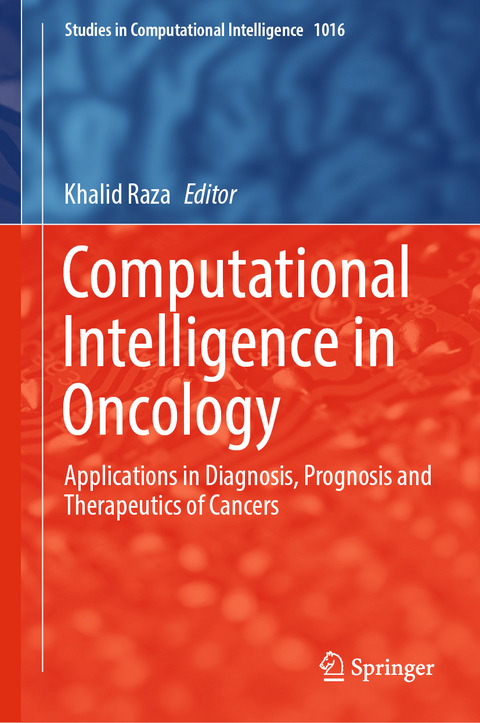
Computational Intelligence in Oncology
Springer Verlag, Singapore
978-981-16-9220-8 (ISBN)
The cancer has been known as a heterogeneous disease categorized in several different subtypes.
This book encapsulates recent applications of CI methods in the field of computational oncology, especially cancer diagnosis, prognosis, and its optimized therapeutics.
The cancer has been known as a heterogeneous disease categorized in several different subtypes. According to WHO’s recent report, cancer is a leading cause of death worldwide, accounting for over 10 million deaths in the year 2020. Therefore, its early diagnosis, prognosis, and classification to a subtype have become necessary as it facilitates the subsequent clinical management and therapeutics plan. Computational intelligence (CI) methods, including artificial neural networks (ANNs), fuzzy logic, evolutionary computations, various machine learning and deep learning, and nature-inspired algorithms, have been widely utilized in various aspects of oncology research, viz. diagnosis, prognosis, therapeutics, and optimized clinical management.
Appreciable progress has been made toward the understanding the hallmarks of cancer development, progression, and its effective therapeutics. However, notwithstanding the extrinsic and intrinsic factors which lead to drastic increment in incidence cases, the detection, diagnosis, prognosis, and therapeutics remain an apex challenge for the medical fraternity. With the advent in CI-based approaches, including nature-inspired techniques, and availability of clinical data from various high-throughput experiments, medical consultants, researchers, and oncologists have seen a hope to devise and employ CI in various aspects of oncology. The main aim of the book is to occupy state-of-the-art applications of CI methods which have been derived from core computer sciences to back medical oncology. This edited book covers artificial neural networks, fuzzy logic and fuzzy inference systems, evolutionary algorithms, various nature-inspired algorithms, and hybrid intelligent systems which are widely appreciated for the diagnosis, prognosis, and optimization of therapeutics of various cancers. Besides, this book also covers multi-omics exploration, gene expression analysis, gene signature identification of cancers, genomic characterization of tumors, anti-cancer drug design and discovery, drug response prediction by means of CI, and applications of IoT, IoMT, and blockchain technology in cancer research.
Dr. Khalid Raza is Assistant Professor at the Department of Computer Science, Jamia Millia Islamia (Central University), New Delhi. Dr. Raza has also served as “ICCR Chair Professor” at Faculty of Computer & Information Sciences, Ain Shams University, Cairo, Egypt. He has over 10 years of teaching & research experience in the field of computational intelligence and its various applications. He has contributed over 80 research articles in reputed journals and edited books, one single-authored book. Dr. Raza has reviewed over 100 research articles for reputed journals/conferences in the last 5 years. He has also edited 3 books with different publishers including Springer, Elsevier, and CRC Press. He is Academic Editor of PeerJ Computer Science. Dr. Raza has delivered several keynote addresses, invited talks, public lectures, and seminars in national and international conferences and workshops and chaired technical sessions in various national and international conferences. He has alsoexecuted two Indian governments funded research projects. Dr. Raza is Member of MIR Lab (USA), CSI (India), and SCRS (India). His research interest lies in computational intelligence and its applications in bioinformatics, viro-informatics, and health informatics.
Part 1: Preliminaries.- Chapter 1. Computational Intelligence in Oncology: Past, Present, and Future.- Chapter 2. Machine Learning-based Models and their Applications in Diagnosis, Prognosis and Effective Cancer Therapeutics: Current State-of-the-art.- Chapter 3. Computational Intelligent Systems in Oncology: A Way towards Translational Healthcare.- Chapter 4. Computational Resources for Oncology Research: A Comprehensive Analysis.- Part 2: Cancer Detection, Diagnosis, Survival and Recurrence Prediction.- Chapter 5. Application of Convolutional Neural Networks in Cancer Diagnosis.- Chapter 6. Automatic Cancer Detection Using Probabilistic Convergence Theory.- Chapter 7. Computational Intelligence Methods for Cancer Survival Prediction.- Chapter 8. Breast Cancer Survival Prediction Using Machine Learning.- Chapter 9. Deep Learning Models for Classification of Brain Tumor with Magnetic Resonance Imaging Images Dataset.- Chapter 10. Predicting the Cancer Recurrence using Artificial NeuralNetworks.- Chapter 11. Computer Intelligence in Detection of Malignant or Premalignant Oral Lesions: The Story so far.- Chapter 12. Fuzzy Logic-based Hybrid Models for Clinical Decision Support Systems in Cancer.- Part 3: Predicting Cancer Biomarkers, Therapeutic Targets, Drug Response, and Drug Design, Discovery, and Development.- Chapter 13. Predicting Biomarkers and Therapeutic Targets in Cancer.- Chapter 14. Computational Intelligence: A Step Forward in Cancer Biomarker Discovery and Therapeutic Target Prediction.- Chapter 15. Computational Intelligence Based Cheminformatics Model as Cancer Therapeutics.
| Erscheinungsdatum | 04.03.2022 |
|---|---|
| Reihe/Serie | Studies in Computational Intelligence ; 1016 |
| Zusatzinfo | 70 Illustrations, color; 24 Illustrations, black and white; XX, 467 p. 94 illus., 70 illus. in color. |
| Verlagsort | Singapore |
| Sprache | englisch |
| Maße | 155 x 235 mm |
| Themenwelt | Informatik ► Theorie / Studium ► Künstliche Intelligenz / Robotik |
| Medizin / Pharmazie ► Medizinische Fachgebiete ► Onkologie | |
| Medizin / Pharmazie ► Medizinische Fachgebiete ► Psychiatrie / Psychotherapie | |
| Technik | |
| Schlagworte | Anti-cancer Drug Design • Anti-cancer Drug Response Prediction • Artificial Intelligence • Cancer Prediction • Gene expression analysis • gene signature • survival prediction |
| ISBN-10 | 981-16-9220-3 / 9811692203 |
| ISBN-13 | 978-981-16-9220-8 / 9789811692208 |
| Zustand | Neuware |
| Haben Sie eine Frage zum Produkt? |
aus dem Bereich


